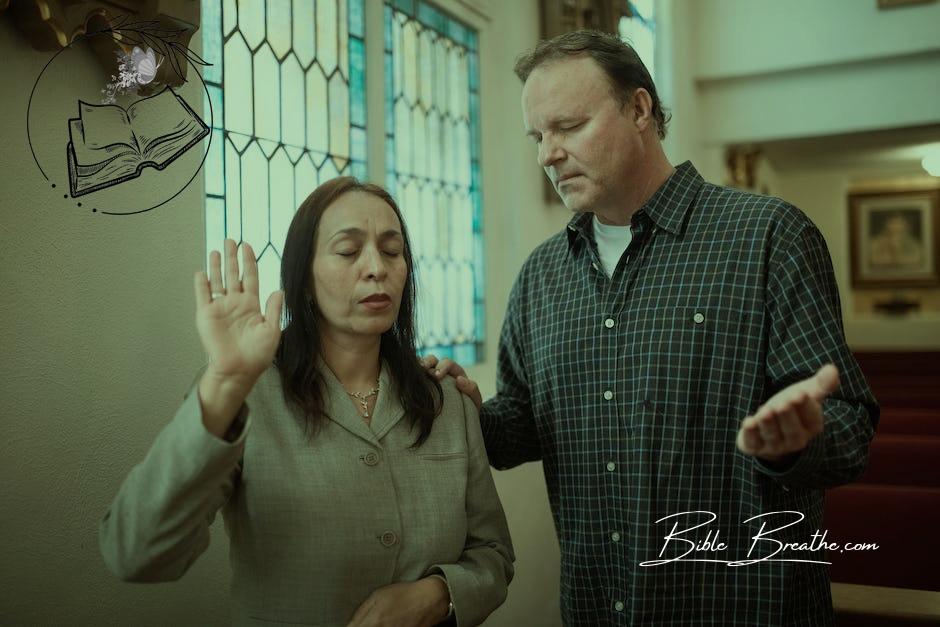God’s got your back when they hurt you!
Yeah, I know, it’s a hot topic.
When life throws betrayals your way, it’s tempting to seek your own justice.
But, fam, let’s dive into this divine justice thing, straight from the Bible.
It’s about setting up some faith-fueled guardrails when the hurt is real.
See, you can’t escape those backstabs and letdowns.
So, what’s the deal with betrayal and God’s plan in all this?
It’s all about rock-solid faith, building trust when things are shaky, and finding the strength to forgive.
Like, we’re talking healing on a whole new level.
God’s got this divine retribution plan that’s out of this world.
So, how do we handle the hurt, and what’s our role in this grand story?
Join me as we walk this path together, learning about faith, trust, and the justice God’s got lined up for you.
🙌
Key Takeaways
-
Faith and Trust in God’s Plan: Understanding that God will deal with those who hurt you reminds us of the importance of faith and trust in His divine plan. It’s a belief that justice will prevail in the end, even when we face adversity.
-
The Healing Power of Forgiveness: While God may eventually address the actions of those who hurt us, forgiveness plays a crucial role in our own healing. Forgiveness is not just for the wrongdoer but also for our own well-being. It allows us to let go of resentment and find inner peace.
-
Setting Healthy Boundaries in Relationships: God’s response to those who hurt us doesn’t negate the importance of setting healthy boundaries in relationships. It’s essential to protect ourselves from ongoing harm while also allowing room for reconciliation and personal growth.
-
Patience and Perspective: Recognizing that God will deal with wrongdoers can help us exercise patience and gain a broader perspective on life’s challenges. It reminds us that justice may not always be immediate, but we should remain steadfast in our faith.
-
Turning to Scripture: When dealing with hurt, turning to scripture for guidance and comfort can be a source of strength. The Bible offers wisdom on forgiveness, love, and seeking God’s guidance in difficult times.
Remember that while it’s comforting to know that God will ultimately address those who hurt us, it’s also essential to actively work on our own emotional healing and well-being by applying these key takeaways in our lives.
God’s Response to Those Who Hurt You

Photo modified by BibleBreathe.com. Original photo by RDNE Stock project on Pexels
Life’s journey often weaves in moments of pain and betrayal, a common thread in the human experience.
When the sting of another’s actions pierces deep, our instinct screams for payback, for fairness.
But what does the Good Book have to say about this?
Let’s dive into the age-old wisdom it holds regarding hurt and how God deals with those who wound us.
God’s Justice: A Higher Court
Beloved, don’t play the avenger. Let God do His thing. As it’s written: ‘Vengeance is mine; I will repay,’ says the Lord.” – Romans 12:19 (KJV)
This verse, it’s a reminder—vengeance isn’t our gig.
God’s got this.
He’s the ultimate Judge, ensuring justice when we’ve been wronged.
It’s like having the wisest, fairest judge presiding over your case, guaranteeing the right outcome.
Let that soak in.
Forgiveness: Lighten Your Load
“If you don’t forgive others, your Father won’t forgive you. It’s that simple.” – Matthew 6:15 (KJV)
Forgiveness, now that’s a big deal in these sacred pages.
It’s more than just letting go of the hurt.
It’s understanding that we’ve been forgiven for our mess too.
Forgiving others is like shedding a weight you’ve been carrying—it’s liberating, and it lets you step forward with a bounce in your step.
Trusting God’s Grand Plan
“I’ve got plans for you, good ones. Thoughts of peace, not of tearing you down. I’m setting you up with a future.” – Jeremiah 29:11 (KJV)
When the hurt runs deep, trust can crumble.
But the Bible nudges us to remember, even when we’re hurting, God’s got plans.
Purposeful plans.
Trusting that?
It’s like finding a hidden path in the woods, a way forward, even in the thick of it all.
So, when the world stings, the Bible’s advice?
Let go of revenge, embrace forgiveness, and lean into God’s justice and plan.
It’s like letting the ultimate defender fight your battles, ensuring justice is served just right.
Trust it.
Trusting in Divine Justice: God’s Got Your Back When You’re Hurt

Photo modified by BibleBreathe.com. Original photo by Andrea Piacquadio on Pexels
Life’s journey isn’t always a smooth ride.
There are moments when someone’s actions cut deep, like a sharp knife through the fabric of trust.
It might be a friend’s betrayal, a promise shattered to pieces, or a cruel act that leaves scars on your heart.
In those tough times, you can’t help but wonder, “Will justice ever come knocking on their door?
Will those who’ve caused me pain face the consequences?” Well, my friend, that’s where faith and the wisdom of Christian speaker Henry Cloud come into play.
The Wisdom of Henry Cloud: Setting Boundaries for Healing
Now, Henry Cloud, he’s a Christian speaker who knows a thing or two about navigating life’s twists and turns.
He’s all about setting healthy boundaries in our relationships.
And when it comes to dealing with those who’ve hurt us, it’s like drawing a line in the sand, defining what’s in our control and what’s not.
It’s not about seeking revenge or letting bitterness take root; it’s about safeguarding your heart while making space for divine justice.
“Don’t get tired of doing what is good. At just the right time, we will reap a harvest of blessing if we don’t give up.” – Galatians 6:9 (KJV)
Cloud’s wisdom encourages us to focus on what we can do—our actions and reactions.
It’s like putting up a fence around your heart, protecting it from further harm, while having faith that God’s got the rest covered.
The Power of Positive Influences on Your Healing Journey
Now, let’s talk about surrounding yourself with the right crowd.
Healing and dealing with those who’ve hurt you involve choosing your company wisely.
It’s not about cutting off everyone who’s ever caused you pain; it’s about seeking out those who uplift and support you.
Think of it like tending a garden.
You want friends who water your soul like a well-tended garden, nurturing your growth and strength.
Their presence becomes a source of encouragement as you navigate the tricky path of forgiveness and trusting in God’s divine plan.
Above all else, guard your heart, for everything you do flows from it.” – Proverbs 4:23 (KJV)
In closing, when you’re grappling with the pain of betrayal or hurt caused by others, remember this: God’s watching.
He’s the ultimate judge of divine justice.
Even if you don’t see immediate payback, trust in His timing and His plan.
By following Henry Cloud’s wisdom on setting boundaries and surrounding yourself with positive influences, you take steps toward healing, forgiveness, and, most importantly, trusting that God’s got your back when it comes to dealing with those who’ve hurt you, in His own way and in His own time.
Navigating God’s Blueprint for Relationships

Photo modified by BibleBreathe.com. Original photo by Tim Mossholder on Pexels
In the intricate tapestry of life, relationships are like the threads that weave our stories.
Some relationships resemble vibrant threads, bringing joy and support, while others can feel like prickly thorns that leave us wounded.
But how do we distinguish between relationships that God has ordained and those that cause us pain?
Let’s journey together through the signs of a God-given relationship and understand why recognizing them matters.
Signs of a God-Ordained Connection
“Every good gift and every perfect gift is from above, and cometh down from the Father of lights, with whom is no variableness, neither shadow of turning.” – James 1:17 (KJV)
God’s blessings often come in the form of relationships that bring joy, peace, and personal growth.
These connections are like a warm embrace on a chilly day, offering solace and strength when we need them most.
-
Boundaries that Nurture: In God-ordained relationships, boundaries are not barriers but nurturing fences. They create a safe space where individuals can flourish without fear of harm or betrayal.
-
Forgiveness in Action: Forgiveness isn’t just a concept; it’s a way of life in these relationships. When conflicts arise, there’s a willingness to forgive and reconcile, mirroring God’s boundless forgiveness toward us.
-
Trust and Faith as Anchors: Trust in each other and faith in God’s plan are the anchors of such relationships. It’s like embarking on a journey together across the sea of life, confident that God is at the helm, guiding the way.
Identifying Harmful Relationships
The prudent sees danger and hides himself, but the simple go on and suffer for it.” – Proverbs 22:3 (ESV)
Not all relationships are part of God’s divine plan.
Some can be harmful, causing emotional distress.
Recognizing the signs of a harmful relationship is vital for our well-being.
-
Persistent Pain and Betrayal: If a relationship consistently inflicts pain, betrayal, and emotional harm, it may not align with God’s intentions.
-
Boundary Blindness: Relationships that disregard healthy boundaries can lead to emotional chaos and turmoil.
-
The Grudge Trap: In relationships without forgiveness, grudges and resentment can take root, poisoning the connection.
-
Doubt and Discord: When trust and faith in God’s plan are absent, discord and strife may become the norm.
In conclusion, God blesses us with relationships that reflect His love and grace.
These connections are defined by nurturing boundaries, a culture of forgiveness, trust, and unwavering faith.
Conversely, harmful relationships often lack these qualities and can lead to pain and emotional distress.
By discerning God’s hand in our relationships, we can find comfort in His plan and the assurance that He will address those who have caused us harm, guiding us towards healthier and more fulfilling connections.
Embracing the Transformative Magic of Forgiveness

Photo modified by BibleBreathe.com. Original photo by Ashlee Marie on Pexels
In the complex world of human emotions, forgiveness stands as one of the most challenging yet powerful experiences.
It’s a topic that hits close to home in matters of faith, with the Bible shedding light on the incredible potential of forgiveness to change lives.
Biblical Tales of Forgiveness
The Bible is a treasure trove of forgiveness stories, proving that even in the face of deep pain and betrayal, mercy can triumph.
Take, for instance, the parable of the prodigal son.
Here, a father forgives his wayward child who had recklessly squandered his inheritance.
This act of forgiveness beautifully mirrors the unconditional love and divine forgiveness God extends to us.
“But when he was yet a great way off, his father saw him, and had compassion, and ran, and fell on his neck, and kissed him.” – Luke 15:20 (KJV)
Similarly, the tale of Joseph in the Old Testament serves as a potent example of forgiveness.
Joseph forgave his brothers who had betrayed him and sold him into slavery.
In doing so, he not only broke free from the chains of resentment but also rescued his family during a time of famine.
These biblical narratives remind us that forgiveness isn’t a sign of weakness but a testament to spiritual strength and divine grace.
The Freedom and Healing Found in Forgiveness
Choosing to forgive those who’ve hurt us is a challenging journey, akin to carrying a heavy burden for years and finally deciding to lay it down.
The moment you do, it’s like a weight lifting off your shoulders, allowing you to breathe freely once more.
“For if ye forgive men their trespasses, your heavenly Father will also forgive you.” – Matthew 6:14 (KJV)
Forgiveness doesn’t excuse the wrongdoer’s actions or suggest what they did was right.
Instead, it sets you free from the prison of bitterness, anger, and hurt.
It’s an act of faith in God’s divine plan, believing that He’ll handle matters of justice in His own way.
Moreover, forgiving others reflects the love and forgiveness we’ve received from God.
It’s paying forward the grace we’ve been shown, even when we don’t deserve it.
In conclusion, as challenging as it may be, forgiveness is a vital part of our faith journey.
By drawing inspiration from biblical stories and understanding the freedom and healing it brings, we can begin to release the grip of hurt and betrayal in our lives.
Remember, when you forgive, you not only extend God’s love to others but also unlock the door to divine healing and restoration in your own heart.
Holding Firm to Trust in God Through Life’s Storms

Photo modified by BibleBreathe.com. Original photo by RDNE Stock project on Pexels
Life often tosses us into turbulent waters, testing the strength of our faith and trust in God.
When we find ourselves hurt and battered by the storms of adversity, it’s easy to wonder how God will handle those who have caused us pain.
But take heart, my friends, for the Bible is a treasure trove of stories about individuals who faced trials and emerged with their trust in God unshaken.
Let’s embark on a journey through these tales of faith in the midst of life’s tempests and understand why holding onto unwavering trust in God’s plan is essential.
Stories of Faith Amidst Life’s Tempests
Job: A Beacon of Endurance
“Though he slay me, yet will I trust in him.” – Job 13:15 (KJV)
The story of Job stands as a profound testament to faith in the face of extreme adversity.
Despite losing his wealth, health, and loved ones, Job clung to his trust in God.
His story reminds us that even in our darkest moments, we can choose to trust in God’s wisdom and plan.
Joseph: From Betrayal to Blessing
“But as for you, ye thought evil against me; but God meant it unto good.” – Genesis 50:20 (KJV)
Joseph’s journey was marked by betrayal, slavery, and imprisonment.
Yet, he held onto his faith and trust in God’s divine plan.
Ultimately, he rose to a position of power and became a source of salvation for his family during a time of famine.
The Profound Significance of Unshakable Trust
Trust in the Lord with all thine heart; and lean not unto thine own understanding.” – Proverbs 3:5 (KJV)
In the face of adversity, it’s only natural to question why God permits pain and suffering.
However, the Bible encourages us to trust in God’s wisdom, even when His plan appears inscrutable.
It’s akin to placing our trust in a skilled pilot during turbulent skies; though we may not see the path ahead, we have faith in the journey’s ultimate destination.
-
Divine Justice and Retribution: Trusting God means believing that He will ultimately bring justice and retribution to those who have inflicted harm upon us. It’s akin to having faith that a righteous judge will ensure that wrongs are made right.
-
Healing for the Spirit: Trusting God opens the door to spiritual healing. It’s like a wounded heart finding solace in the tender hands of a loving healer who tends to our emotional scars.
In conclusion, placing our trust in God during life’s trials is a testament of our faith and a wellspring of inner strength.
Drawing inspiration from the tales of endurance in the Bible and maintaining unwavering trust in God’s plan, we can navigate the storms of life with hope and unwavering assurance.
Just as the heroes of faith in the Bible persevered through their challenges, we too can find comfort in the knowledge that God will handle those who have hurt us in His own perfect way.
Frequently Asked Questions (FAQs) About God Will Deal With Those Who Hurt You
What does God say about those who hurt you?
The Bible encourages forgiveness and turning the other cheek when hurt.
In Matthew 5:39, Jesus teaches, ‘But I say to you, Do not resist the one who is evil.
But if anyone slaps you on the right cheek, turn to him the other also.’ Forgiveness is a central theme in Christian teachings.
Does God punish those who hurt us?
God’s response to those who hurt us varies in the Bible.
It emphasizes forgiveness, leaving judgment to God.
The principle of ‘Vengeance is mine; I will repay, says the Lord’ is seen in Romans 12:19.
Ultimately, God’s justice is just, and humans are encouraged to forgive and seek reconciliation.
Why does God allow hurtful people into our lives?
God’s allowance of hurtful people is complex and not always directly caused by His will.
It can serve as a test of faith, an opportunity for personal growth, or a chance to exemplify forgiveness and love as Jesus taught.
It might also prompt us to seek refuge and strength in God, learning to overcome challenges while maintaining faith and practicing compassion.

